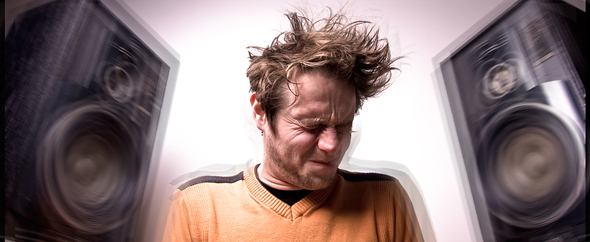I’m sure almost everyone has a parent who has warned them to turn down loud music or else they’d go deaf. While these warnings may sound exaggerated, there is some truth to them. As a matter of fact, overexposure to loud noise, from any number of different sources, does in fact put you at risk of both temporary and permanent hearing loss.

Being exposed to loud noises for a period of time results in just temporary loss of hearing. This sort of hearing loss usually recovers by the end of the day with rest. The function the ear performs protects the inner ear hair cells by stiffening of the eardrum, which reflects some of the sound off of it. However, evolution is still in action, and the fact that longer durations of loud noises from day to day in workplaces are more abundant than ever, especially in jobs requiring construction or factory work. Because we’ve only been exposed to this for the last thousand years or so, we’ve yet to fully adapt to such consistent damage, and as such, the two muscles in your middle-ear that cause your ear drum to stiffen fatigue after extended periods of time, allowing sound to sometimes cause permanent damage when exposed frequently.

Many people experience what is called tinnitus, which is a term for what is sometimes referred to as a “ringing” in your ears, or a feeling of “fullness”. However, tinnitus is actually considered a symptom, rather than a condition. It’s related to general loss of hearing, and appears when you experience ear injuries or hearing loss related to age.
All in all, our ears are delicate, and very much still developing, and it’s better to play it safe.
If you want to experiment with the effects of your every day life on your hearing, a common test is to wear a single earplug in one ear, and not in the other. Proceed to go about your day normally. At the end of it, remove the ear plug, and you should notice the difference in hearing between your ears. You’d be surprised to know how much they’re affected, even if it’s only temporary!
Sources:
Research:
http://kidshealth.org/en/kids/rock-music.html
http://www.earplan.com/blog/bid/200016/How-do-loud-sounds-damage-my-hearing
http://www.mayoclinic.org/diseases-conditions/tinnitus/home/ovc-20180349
Images:
http://www.ithacaaudio.com/wp-content/uploads/2012/05/Loud-Speakers-Person.jpg https://s-media-cache-
http://ak0.pinimg.com/736x/3c/aa/49/3caa49d83e8955011b5b3550ae2fa727.jpg

My roommate in high school experienced tinnitus after a long period of listening to music and some listening practice materials. And she spent almost half month in hospital to treat tinnitus. But I have no idea about the causation. After reading this post, I find the answer that the two muscles in middle-ear are the key factors. So we should carefully protect our ears.
Just goes to show how common and dangerous it can be. Even though the name may sound all medical and threatening, it really is more present than you’d think! I’d be interested to find out what the treatment plan is for somebody who suffers from that kind of damage. Surely a lot of it has to do with self recovery, and just playing it safe, but I do wonder what a doctor would do besides diagnose it.
Awesome blog topic especially being at a school like Penn State many of us know being in a frat house gets laud. I have been stuck standing right next to giant speakers playing electronic dance music and I can’t lie I thought it was going to damage my eardrum. I was interested to find out that sleep will help in recovery of your eardrum. I also found it interesting that because sounds are getting lauder the better technology gets but our ears are actually adjusting. Heres a link to an EDM song that almost broke my eardrum! https://www.youtube.com/watch?v=ih73X66bWto
This was an interesting topic to write about. I wish your argument had a bit more information, such as studies of people that play in a band and their hearing as a result. In a study that I found revolving around that idea, it was said that certain instruments within a band caused more Tinnitus than other instruments. For example, students in a marching band that played percussion instruments later reported the most ear/hearing effects than any other type of instrument. Here is the study if you would like to read further on this topic: http://www.laurenscharff.com/courseinfo/SL02/jv2hearingloss.htm
This blog is very informative. I agree there could be more information about some potential scenarios that could cause hearing loss, but it is O.K. because I get the picture and understand your concept and scientific points. Fun Fact: I once “lost hearing” for a temporary (but “extended”) period of time when I was a child from having a contest with my friends on who could listen to music the loudest on our headphones (I won). The consequence was that I couldn’t hear for the rest of the day clearly, and so I went to urgent care and had a hearing test and they gave me ear drops.
This is a very strong blog, in my opinion. I do think that there could be slightly more information to back up your claim, but I do think it was very well written. It was very easy to follow, and I found it to be very interesting and relatable. I have a friend who’s dad is suffering form tinnitus, so it was very applicable. Hereis a video about the potential cure for tinnitus.